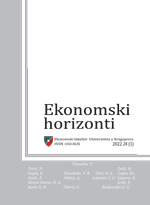BUSINESS AND INSTITUTIONAL DETERMINANTS OF EFFECTIVE TAX RATES IN SERBIAN BANKS
Maja Putica
OTP bank Serbia a.d. Novi Sad, The Republic of Serbia
The objective of the current paper is to study the influence of the selected business and institutional determinants on the annual effective tax rates in banks in Serbia. Panel data regression models are applied on 113 observations, covering the period from 2017 to 2021, where the accounting and current effective tax rates are used as a measure of the actual tax burden. The results show that the effective tax rate in banks in Serbia is significantly below the statutory level. Furthermore, for each data set, the coefficients of changes in the effective tax rate are calculated, and the most adequate model is selected using the Hausman and Breusch-Pagan tests. In the first model, the biggest change in the effective tax rates is caused by change in leverage, merger and acquisition processes and the bank size. The presence of loan loss provisions in the model completely highlights the impact of profitability and leverage. Finally, in the last model, banks with a profit before tax can manage effective tax rates and tax burdens by regulating capitalization levels. The results of this study are of interest for economy creators and for business managers in banks, helping them in effective tax planning and managing the results.
Keywords: tax burden, effective tax rate, leverage, loan loss provisions, capitalization, profitability
JEL Classification: G21, H21




